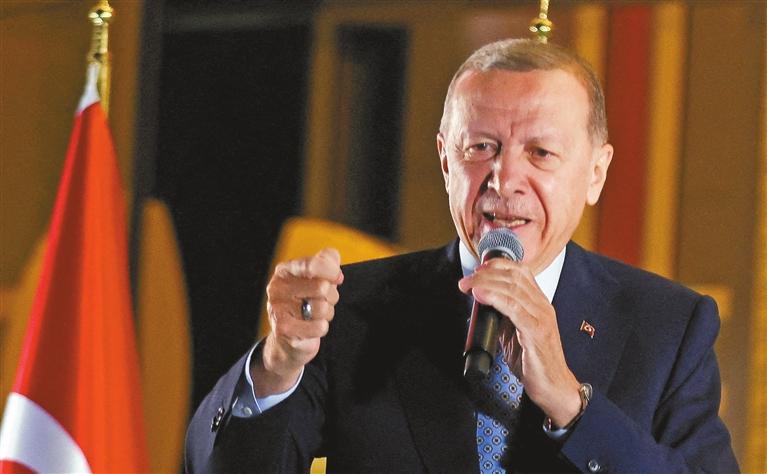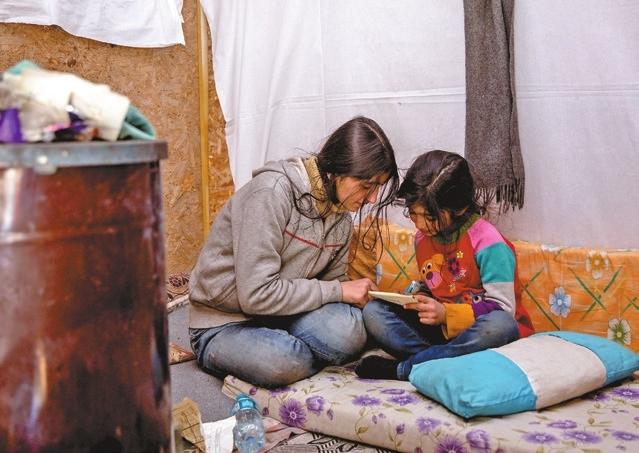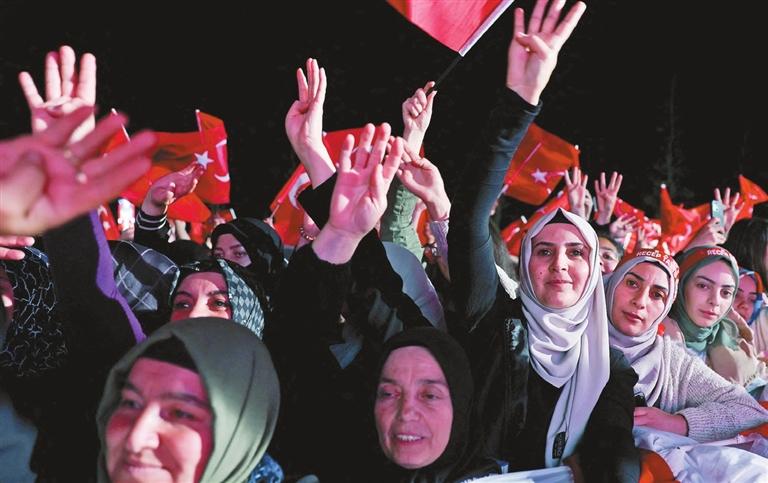


TURKISH President Recep Tayyip Erdogan’s two decades of dominance over the country’s politics will continue after his win in Sunday’s election. Known for his combative populism and strategies to consolidate his power, Erdogan now looks ahead to another five-year term. Erdogan won 52.14% of the vote while 47.86% went for his opponent Kemal Kilicdaroglu, according to Ahmet Yener, the head of Türkiye’s Supreme Election Council. “It is not only us who won, it is Türkiye,” Erdogan said, in a victory speech at the presidential palace in Ankara. “It is our nation that won with all of its elements. It is our democracy.” Türkiye has played an increasingly robust and sometimes contentious role on the global stage as a key NATO member and major military power in the Black Sea. At home, he still faces soaring inflation, a highly-criticized, sluggish response to massive earthquakes in February and concerns about his powerful rule. Erdogan, 69, led a divisive campaign in which he tapped into the people’s fear of instability following a 2016 coup attempt and multiple conflicts. He accused his opponent of having ties to Kurdish militants, who conduct attacks against Turkish security forces in the southeast. He reminded people of the ongoing civil war next door in Syria. He won support by promising to make the country a global military and industrial power — a Turkish-built electric car was highlighted in his campaign. That helped counter dissatisfaction with an economic crisis that has seen high inflation and a weakened currency — aggravated by Erdogan’s policies of maintaining low-interest rates. The government’s poor building code enforcement and slow response to February’s earthquakes are blamed for the high death toll — some 50,000 lives lost in Türkiye. Who support Erdogan? Two decades ago, Erdogan came into office as a champion of working-class people and religious conservatives who felt neglected and repressed by previous secular governments. For many years, women who wore headscarves were banned from attending schools or working in jobs. Erdogan changed those laws and to this day many people, conservative women in particular, see him as someone who looks after them. At a polling station in Istanbul on Sunday, a mother and daughter cast their votes for Erdogan. “I think he is more respectful of my choices and my freedom,” said the mother, Sabiha Dogan, referring to the headscarves she and her daughter wore. As they entered the polling station, two women who supported the opposition made derogatory comments about their headscarves. Dogan and her daughter Hulya, felt validated in their choice of candidate. For the millions who voted against him, Erdogan is seen as an authoritarian. He’s accused of allowing corruption to flourish, leading to shoddy, unregulated construction that collapsed in the quakes. Erdogan had an upper hand in the election. He has near-total control of Türkiye’s broadcast media. While Erdogan made frequent and lengthy appearances on TV, his challenger, Kilicdaroglu, had to make do with social media to get his message across. The incumbent Erdogan also handed out benefits to millions of citizens and raised the minimum wage several times in the last year, which won him support. Syrian refugees reassured Many of Türkiye’s nearly 4 million Syrian refugees were among those celebrating Erdogan’s win. A decade ago he oversaw an open-door policy for refugees escaping war in neighboring Syria. As the Turkish economy faltered, many began to see refugees as a burden. Opposition politicians, including Kilicdaroglu, scapegoated refugees and Erdogan’s refugee policy, leading to a rise in discrimination and hateful attacks. Kilicdaroglu ran an openly anti-refugee campaign. His promise to send all Syrians back to Syria was one of the most repeated slogans. Erdogan also gave in to public pressure on the refugee issue. While he condemned Kilicdaroglu for his inflammatory language, the Turkish government has deported hundreds of Syrians and Erdogan said he would build housing in Turkish controlled parts of northeastern Syria to resettle 1 million refugees voluntarily. But many refugees still see him as being more sympathetic to them. Key player in international issues Türkiye is in NATO, sits close to the wars in Ukraine and Syria and often frustrates Western powers in how it negotiates those conflicts. Erdogan has maintained close ties with Russia and refused to participate in Western sanctions, while also supplying weapons to Ukraine. Analysts say Erdogan may eventually approve Sweden’s membership to NATO — which is important to the west in order to counter Russia — in exchange for F16 fighter planes from the United States. He helped broker a deal with the United Nations between Ukraine and Russia, to allow Ukrainian grain exports through a Russian blockade. Meanwhile, he’s also expanded the Turkish military’s reach and control over areas in northern Syria — a concern to Kurdish groups allied with the U.S. in the ongoing fight against ISIS remnants. The next five years will likely see a continuation of Erdogan walking a fine line and his transactional approach to foreign policy. “There’s absolutely no reason to think that [Erdogan] would reverse course or soften his approach,” said political analyst Selim Koru. “There is sort of a Western bloc that is broadly geopolitically aligned, and the Bloc wanted Türkiye to be in its camp. Türkiye essentially has said no, it wants its own camp and isn’t interested in participating in any kind of geopolitical alignment where it isn’t the boss,” said Koru.(SD-Agencies) | 
